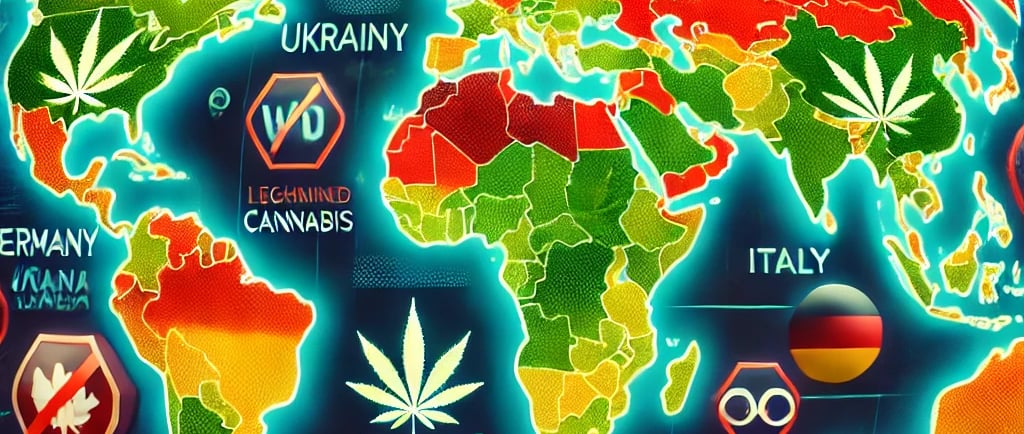The Changing Global Landscape of Cannabis Legislation: Legalizations and Prohibitions in 2025
The cannabis industry and its regulation are evolving rapidly worldwide, with significant shifts in legislation occurring in both progressive and conservative directions. Some nations are embracing legalization for medical or recreational purposes, while others are imposing stricter bans. Here's a detailed overview of the latest changes in cannabis legalization and prohibition around the world.
CANNABIS GUIDE
1/20/20253 min read


Countries Legalizing Cannabis
Germany: Legalization of Recreational Cannabis
In 2024, Germany became the third country in the European Union to legalize cannabis for personal use, following Malta and Luxembourg. Under this new law:
Adults aged 18 and over can possess up to 25 grams of cannabis in public.
Each household is allowed to cultivate up to three cannabis plants for personal use.
Non-profit cannabis social clubs with a maximum of 500 members can distribute cannabis to members.
This move aligns with Germany's strategy to reduce black market activity and promote safer cannabis consumption under regulated conditions.
Ukraine: Legalization of Medical Cannabis
In August 2024, Ukraine legalized cannabis for medical use, a major milestone for the war-stricken nation. The decision aims to help individuals dealing with:
Post-traumatic stress disorder (PTSD), especially war veterans.
Chronic pain and other debilitating medical conditions.
The law allows regulated cultivation of hemp for medical, industrial, and scientific purposes. Medical cannabis is available only with a prescription, ensuring that distribution remains controlled and monitored.
Other Notable Advances
Czech Republic: Progressing toward full legalization for recreational use, with legislation expected in 2025.
Malaysia: In a surprising turn, Malaysia approved cannabis for medical use in 2024 under strict guidelines, signaling a significant shift in Asia's stance on the drug.
Countries Tightening Cannabis Restrictions
Japan: New Restrictions on THC and CBD
While Japan traditionally enforces strict cannabis laws, the government recently introduced even tighter regulations:
A 0.001% THC limit on CBD products was proposed, effectively banning most CBD oils and related items.
These changes come as part of amendments to the Cannabis Control Act, designed to prevent recreational use while allowing limited medical cannabis.
Critics argue these restrictions could stifle Japan’s nascent CBD market, which has seen significant growth in recent years.
Italy: Ban on ‘Cannabis Light’ Products
Italy is targeting its "cannabis light" industry, which produces low-THC hemp products. Prime Minister Giorgia Meloni's government has advanced a bill to:
Ban products derived from the hemp flower, even those with THC levels below 0.2%.
Crack down on an industry that has flourished under current loopholes in Italian law.
Opponents warn that this move could devastate the country's cannabis light sector, which provides thousands of jobs and significant economic value.
Other Nations Strengthening Prohibitions
Singapore: Maintains one of the strictest drug policies globally, with severe penalties for cannabis possession or use.
Russia: Recently announced harsher penalties for possession, including extended jail sentences.
Global Trends in Cannabis Legislation
The contrast in approaches highlights how cannabis remains a divisive issue globally. As of 2025:
Countries Embracing Legalization:
Canada, Uruguay, Thailand, and several U.S. states have fully legalized recreational cannabis.
Countries like Germany and Malta lead the way in Europe.
Countries Doubling Down on Prohibition:
Many nations in Asia, the Middle East, and Africa maintain strict anti-cannabis laws, often with harsh punishments.
Implications of Legalization and Prohibition
For Legalizing Countries
Legalizing cannabis often brings:
Economic Benefits: Tax revenues and job creation from cannabis industries.
Public Health Focus: Regulated markets reduce the risks associated with unregulated black market products.
Cultural Shifts: Increased acceptance and integration of cannabis use into mainstream society.
For Prohibiting Countries
Nations enforcing bans argue:
Health Concerns: Fears of addiction, mental health issues, and increased use among youth.
Cultural Preservation: Maintaining traditional values and societal norms.
Law Enforcement: Preventing the rise of illegal activities associated with drug trafficking.
The Future of Cannabis Regulation
The global conversation around cannabis legalization is far from over. While many countries are moving towards decriminalization or legalization for medical and recreational use, others are reinforcing their prohibitive stances. This divide reflects the complex interplay of cultural, political, and economic factors that shape cannabis policies worldwide.
As the cannabis industry continues to grow, and with ongoing scientific research highlighting its medical and economic potential, the debate will likely intensify. The coming years may see more countries reevaluating their positions, potentially tipping the global balance toward broader legalization.
